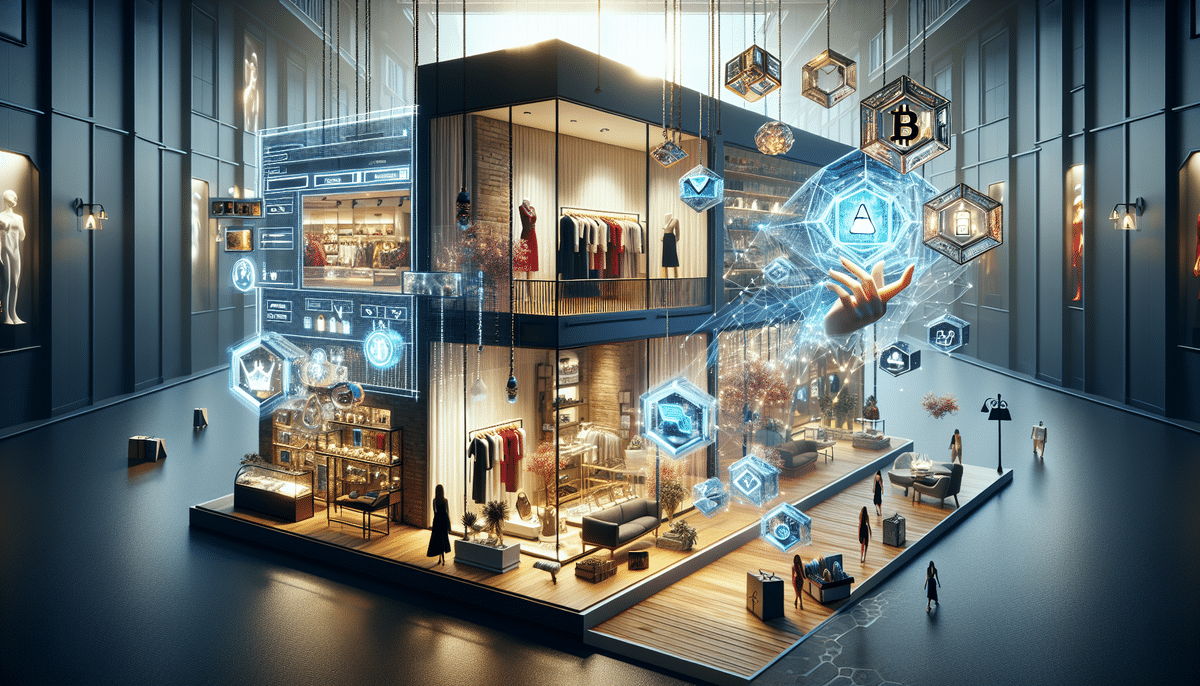The Evolution of Luxury E-Commerce: Authenticity, Ethics, and Consumer Freedom
Luxury e-commerce has been a topic of intense debate in recent years. On one hand, some view it as an artificial industry, where authenticity might be compromised for convenience and profit. On the other hand, proponents argue that luxury e-commerce represents a new era of freedom for consumers, providing greater access to desired high-end products. In this article, we will explore the rise of luxury e-commerce, its impact on traditional retailers, and the ethical dilemmas it presents.
The Rise of Luxury E-Commerce: A Brief Overview
Over the past decade, luxury e-commerce has experienced explosive growth, outpacing the broader retail sector. According to a Deloitte report, global online sales of luxury goods were estimated to reach $60 billion by 2023, up from $27 billion in 2019. This represents a seismic shift in consumer behavior, with more individuals opting to shop online for high-end items such as designer clothing, jewelry, and premium appliances.
This trend has been driven by several factors, including the convenience of online shopping, the ability to easily compare prices and products, and the rise of social media influencers who promote luxury brands to their followers. Additionally, the COVID-19 pandemic accelerated the shift to e-commerce, as more people stayed home and avoided physical stores. As a result, luxury brands have invested heavily in their online presence, with many launching their own e-commerce platforms and partnering with established online retailers to reach a wider audience.
The Debate Over the Authenticity of Luxury E-Commerce
One of the most persistent criticisms of luxury e-commerce is that it's an artificial industry, rife with counterfeit goods and false claims of authenticity. While some online retailers have been accused of selling knockoff products, many others have established themselves as trusted sources for genuine luxury items. The issue of authenticity requires careful consideration by both retailers and consumers.
To address authenticity concerns, many luxury e-commerce retailers are implementing blockchain technology. By creating a digital ledger that tracks the entire supply chain of a luxury item—from creation to sale—retailers can provide consumers with a transparent and verifiable record of the product's authenticity. According to a Forbes article, this technology has the potential to revolutionize the luxury e-commerce industry and restore consumer trust in online retailers.
Another factor in the authenticity debate is the role of third-party authentication services. These services, often used by online retailers, provide an independent assessment of a product's authenticity. While they can be a valuable tool for consumers, they also add an additional cost to the purchase of a luxury item. Retailers must weigh the benefits of using these services against the potential impact on their bottom line.
The Ethical Implications of Luxury E-Commerce
The rise of luxury e-commerce raises several ethical questions. Critics argue that the sector may contribute to the exploitation of workers in low-wage countries where many luxury products are manufactured. Additionally, there are concerns about the environmental impact of shipping products globally and the waste generated by packaging and delivery processes. These are serious issues that require thoughtful consideration by both retailers and consumers.
Another ethical concern is the proliferation of counterfeit products. Online marketplaces have made it easier for counterfeiters to sell fake luxury goods to unsuspecting consumers. This not only harms the reputation of luxury brands but also deceives consumers who may pay high prices for low-quality products. Retailers must take steps to ensure they are selling authentic products, and consumers should be cautious when purchasing luxury items online.
The Advantages and Disadvantages of Luxury E-Commerce
Luxury e-commerce offers numerous advantages, including unparalleled convenience, allowing consumers to shop from the comfort of their homes. Online retailers can also offer a wider variety of products, as they are not limited by the physical space constraints of brick-and-mortar stores. However, some consumers miss the tactile experience of shopping in person, where they can try on clothing or inspect products before purchasing.
Another disadvantage is the potential for counterfeit products. With the rise of online shopping, counterfeiters have more opportunities to sell fake luxury goods, harming brand reputations and deceiving consumers. It's crucial for consumers to research and purchase from reputable online retailers to avoid falling victim to counterfeit scams.
The Impact of Luxury E-Commerce on Traditional Retailers
The growth of luxury e-commerce has profoundly impacted traditional retailers, who struggle to remain competitive amidst changing consumer behavior. Many brick-and-mortar stores have been forced to close, while others have adapted by investing in their own e-commerce platforms.
One significant advantage of luxury e-commerce is the ability to offer a broader range of products. Online retailers can maintain a larger inventory than traditional stores limited by physical space, providing consumers access to a wider array of luxury goods, including items not available locally. Additionally, luxury e-commerce allows for greater personalization and customization of products, attracting consumers seeking unique and exclusive items.
How Luxury Brands are Adapting to the E-Commerce Landscape
Luxury brands have responded to the rise of e-commerce in various ways. Some have partnered with established online retailers like Net-a-Porter, while others have built their own e-commerce platforms. However, some brands remain hesitant, preferring to maintain brick-and-mortar stores as their primary sales channel.
One adaptation strategy is leveraging social media to connect with customers. Many luxury brands have established a strong presence on platforms like Instagram and Facebook, showcasing their products and engaging with followers. Some brands have even launched exclusive collections or limited-edition items through social media channels.
Another strategy involves offering personalized experiences for online shoppers. This can include virtual styling sessions, personalized recommendations based on past purchases, and customized packaging and delivery options. By providing a more personalized and convenient shopping experience, luxury brands can attract and retain customers in the competitive e-commerce market.
The Future of Luxury E-Commerce: Predictions and Trends
The future of luxury e-commerce is poised for continued growth, with several key trends emerging. One of the most significant is the rise of mobile commerce, as consumers increasingly shop via their smartphones. Additionally, technologies like augmented reality (AR) and virtual reality (VR) may enhance the online shopping experience, allowing consumers to virtually "try on" clothing and accessories.
Sustainability and ethical practices are also becoming increasingly important. Consumers are more conscious of the environmental and social impacts of their purchases and are seeking out brands that prioritize sustainability and ethical production. Luxury e-commerce retailers that offer transparency and information about their supply chains and production processes may gain a competitive advantage.
The Role of Social Media in the Growth of Luxury E-Commerce
Social media has played a pivotal role in the growth of luxury e-commerce by allowing brands to connect directly with consumers and build relationships. Platforms like Instagram and Facebook are essential channels for advertising luxury products, with influencers and celebrities often promoting brands to their millions of followers.
Beyond advertising, social media enables luxury brands to showcase their products interactively and engagingly. Many brands use these platforms to share behind-the-scenes glimpses of their design processes and to display products in real-life settings. This approach helps create a more personal connection between consumers and luxury brands, fostering increased loyalty and sales.
Exploring the Psychology Behind Buying Luxury Goods Online
The psychology behind purchasing luxury goods online is multifaceted, involving factors such as social status, self-image, and the desire for authenticity. A key driver of luxury e-commerce is the feeling of exclusivity, as consumers can purchase products that may not be readily available in physical stores.
Additionally, the convenience and accessibility of online platforms allow consumers to explore and purchase luxury items at their own pace, enhancing the overall shopping experience. The ability to access a global marketplace also satisfies the desire for unique and diverse products, further fueling the appeal of luxury e-commerce.
Balancing Freedom and Responsibility in the World of Luxury E-Commerce
The rise of luxury e-commerce presents a paradox: balancing consumer freedom to purchase desired products with retailers' responsibility to operate ethically and sustainably. This challenge requires collaboration and dialogue among all stakeholders, including retailers, consumers, regulators, and policymakers.
To achieve this balance, retailers must adopt transparent practices, ensure the authenticity of their products, and commit to sustainable and ethical production methods. Consumers, in turn, must make informed choices and support brands that prioritize these values. Policymakers can also play a role by establishing regulations that promote transparency and ethical standards within the luxury e-commerce sector.
How Consumer Behavior is Changing in Response to Luxury E-Commerce
The rise of luxury e-commerce has significantly influenced consumer behavior, as individuals increasingly expect the ability to purchase what they want, when they want it. This shift has pressured traditional retailers to innovate and adapt to remain competitive in an increasingly crowded market.
Consumers now prioritize convenience, personalization, and access to a broader range of products, driving retailers to enhance their online offerings. Additionally, the integration of advanced technologies like AR and VR in the shopping experience caters to the modern consumer's desire for immersive and interactive purchasing processes.
Can We Trust the Authenticity Claims Made by Online Retailers?
The issue of authenticity is one of the most hotly debated topics in luxury e-commerce, necessitating careful consideration by both retailers and consumers. While some online retailers have established themselves as trusted sources for genuine luxury products, others have faced accusations of selling knockoffs.
To ensure authenticity, consumers should conduct thorough research and purchase from reputable retailers. Retailers can bolster trust by utilizing technologies like blockchain for supply chain transparency and partnering with third-party authentication services to verify product genuineness.
In conclusion, luxury e-commerce represents both an opportunity and a challenge for retailers and consumers alike. While it offers unparalleled convenience and access to high-end products, it also raises important ethical questions about authenticity, sustainability, and responsibility. Moving forward, it will be crucial for all stakeholders to collaborate in creating a sustainable and ethical e-commerce sector that benefits both consumers and the broader community.






















